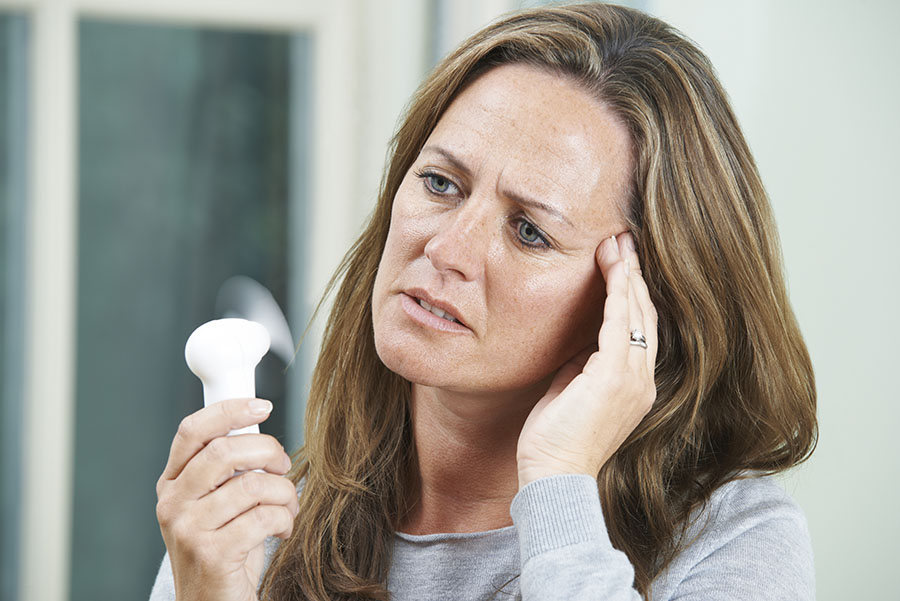
- January 29, 2021
- Comments: 0
- Posted by: Dr. Anushri Shah

Menopause occurs when a woman doesn’t menstruate for 12 consecutive months and can no longer conceive naturally. It generally happens at the age of 45 and 55 years but can also develop before or after this range. Menopause leads to various uncomfortable symptoms like hot flashes and weight gain. For the majority of women, menopause does not require any medical treatment.
Most women start developing menopause symptoms about four years before the date of their last periods. These symptoms can continue four years after a woman’s last period. Only a small fraction of women experience these symptoms for up to a decade before menopause occurs and 1 in 10 women keep on experiencing symptoms for 12 years following their last period. Various factors help determine the time of menopause, including genetics and ovary health. Perimenopause occurs before menopause. It is the period when your hormones change to prepare for menopause.
Many women start perimenopause after their mid-40s. Some women do not experience perimenopause and enter menopause directly. About 1 % of women experience a climactic period before the age of 40 years. This is called premature menopause. About 5% of women undergo menopause before 50 years. This is known as early menopause.
Perimenopause vs. menopause vs. post menopause
Menstrual periods become irregular at the time of menopause. You can experience late periods or can completely skip one or more periods. Menopause is defined as the absence of menstrual flow for one full year. Postmenopause refers to the time after menopause has occurred.
What are the symptoms of menopause?
Every woman’s menopause experience is different. Symptoms get more severe when menopause occurs suddenly or before 50 years of age. Health conditions like cancer or hysterectomy or lifestyle choices like smoking increase the severity and duration of these symptoms. Apart from menstruation changes, the symptoms of perimenopause, menopause, and postmenopause are the same. The changes which take place during perimenopause and menopause are:
1. Lower fertility
As a woman approaches the end of the reproductive stage, the estrogen levels start to fall. This reduces the chances of pregnancy.
2. Irregular menstruation
The first sign of menopause is irregular periods. They may occur more or less frequently than usual and can be heavier as well as lighter.
3. Vaginal dryness and discomfort
Vaginal dryness and itching may start during perimenopause and can continue till menopause. A person with these menopause symptoms can experience discomfort and chaffing during vaginal sex. Also, the breakage of the skin can lead to severe infection. Atrophic vaginitis which involves inflammation of the vaginal wall can occur during menopause. You can get relief from such vaginal dryness by making use of various moisturizers and medications.
4. Hot flashes
Hot flashes are common during menopause. They make a person feel a sudden sensation of heat in the upper body. The sensation can start in the face, neck, and chest and progress upward or downwards.
A hot flash can also lead to:
- Sweating
- Red patches on the skin
Some women experience night sweats and cold flashes in addition to or instead of hot flashes.
5. Sleep disturbances
There is an increased rate of sleep problems during menopause. You can experience a lack of sleep due to:
- Anxiety
- Night sweats
- An increased need to urinate
Get plenty of exercises and avoid heavy meals before bedtime to manage these issues. If they still persist, contact a healthcare provider.
6. Emotional changes
Depression, anxiety, and low mood are common symptoms during menopause. It is completely natural to experience times of irritability and crying spells. While feelings of sadness and irritability are common during the period of menopause, they do not indicate depression. However, if someone experiences a low mood for 2 weeks or longer, she should consult a doctor who will advise her on the best course of action.
7. Trouble focusing and learning
About two-thirds of women face difficulty with concentration and memory during menopause. Maintaining physical and mental health by following a healthful diet and maintaining an active social life can solve these issues.
8. Physical changes
Women develop various physical changes at the time of menopause such as;
- The buildup of fat around the abdomen
- Gaining weight
- Changing in hair color, texture, and volume.
- Breast reduction and tenderness
- Urinary incontinence
However, the relationship between these changes and menopause is not clear.
9. Increased risk of some health conditions
The risk of certain health issues increases after menopause. It is not the menopause but the hormonal changes that result in certain health issues.
Osteoporosis: This is a long-term health condition in which the bone density and strength decreases.
Cardiovascular disease: A decline in estrogen during menopause increases the risk of cardiovascular disease.
Breast cancer: Some types of breast cancer also develop after menopause. Menopause does not lead to breast cancer but the hormonal changes involved appear to increase the risk.
Treatment
Menopause is a natural transition and not a health problem. However, it can lead to unwanted physical and mental changes. Anyone concerned about these changes should seek medical advice.
Divine Mother brings to you a complete detailed guide on menopause, the risks involved with different kinds of health conditions, and the signs and symptoms associated with menopause.

